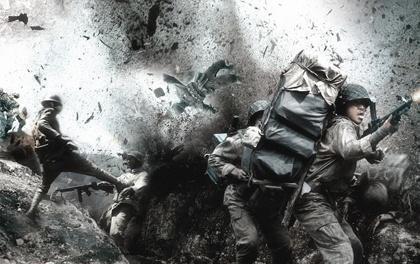In World War II, China experienced a painful and long fourteen years. The original song and dance disappeared overnight, and even if you live in a remote corner, you can't escape the nuisance of war. Faced with the frenzied slaughter of the invaders, the Chinese military and civilians launched a counterattack. But because of the gap in industrial technology, at one time it was only possible to use long guns and short spears to counter fascist guns. Not being afraid of sacrifice does not mean being willing to sacrifice, and there is no warrior who does not want to return to the peaceful life of the past. However, when the country is in danger and the nation is in danger, the love of the children can only be put aside for the time being, how many young men and women are generous to the righteousness, and how many flower season girls go to the battlefield.

The feeling of home and country is a deep-rooted "stubborn disease" in the hearts of Chinese, and it is precisely because of the people who once loved the motherland that we have the prosperity and strength we see today. Among the groups of anti-Japanese fighters, there was such a team. They crossed thousands of mountains and rivers, but they could not get out of the barren mountains. In 1942, the War of Resistance Against Japan was in full swing. In order to defend the Burma Highway, known as the "lifeline of the War of Resistance", 40,000 soldiers embarked on a journey. But what they don't know is that this is a lifetime.
At that time, Britain and China reached an agreement to cooperate with each other. However, differences arose over the strategic deployment of the Burma Road to guard, with the British refusing to cooperate with the Chinese army and choosing to abandon the Burma Road for direct retreat. After the defeat of the first collision, the Chinese army remained on the defensive. However, the Japanese had strong firepower and soon broke the defensive line. In order to preserve combat effectiveness, the Chinese army chose to retreat. The Japanese army pressed the border, and in front of it was the fearsome local "Savage Mountain". At the moment of life and death, forty thousand warriors chose to fight. It is hard to accept that this barren mountain does live up to its reputation. Not only is the fog obscuring the sky, but there are many snakes, insects, rats and ants. By the time they got out of the mountains, the 40,000-strong army had less than 8,000 men left.
It is not an exaggeration to say that britain and the Japanese army joined forces to force these forty thousand soldiers into the "Savage Mountain", and wouldn't they have been shot in British military regulations when they escaped from the battlefield? Maybe it's not your own territory, so you don't want to fight for life and death! In the hearts of those warriors who have been sleeping in the "Savage Mountain", they must be full of regret. How good would it have been to turn around and fight the Japanese to the death at that time, and what would have been the result if the British troops had not withdrawn? Unfortunately, there are no ifs, and now we can only silently remember them.